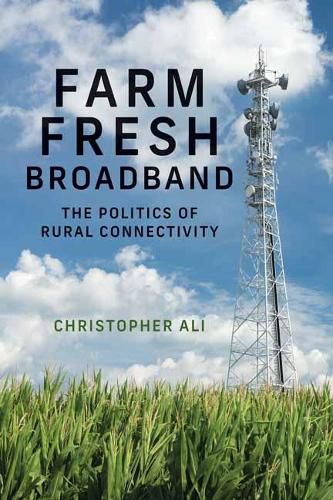Readings Newsletter
Become a Readings Member to make your shopping experience even easier.
Sign in or sign up for free!
You’re not far away from qualifying for FREE standard shipping within Australia
You’ve qualified for FREE standard shipping within Australia
The cart is loading…






An analysis of the failure of U.S. broadband policy to solve the rural-urban digital divide, with a proposal for a new national rural broadband plan.
As much of daily life migrates online, broadband-high-speed internet connectivity-has become a necessity. The widespread lack of broadband in rural America has created a stark urban-rural digital divide. In Farm Fresh Broadband, Christopher Ali analyzes the promise and the failure of national rural broadband policy in the United States and proposes a new national broadband plan. He examines how broadband policies are enacted and implemented, explores business models for broadband providers, surveys the technologies of rural broadband, and offers case studies of broadband use in the rural Midwest.
Ali argues that rural broadband policy is both broken and incomplete- broken because it lacks coordinated federal leadership and incomplete because it fails to recognize the important roles of communities, cooperatives, and local providers in broadband access. For example, existing policies favor large telecommunication companies, crowding out smaller, nimbler providers. Lack of competition drives prices up-rural broadband can cost 37 percent more than urban broadband. The federal government subsidizes rural broadband by approximately $6 billion. Where does the money go?
Ali proposes democratizing policy architecture for rural broadband, modeling it after the wiring of rural America for electricity and telephony. Subsidies should be equalized, not just going to big companies. The result would be a multistakeholder system, guided by thoughtful public policy and funded by public and private support.
$9.00 standard shipping within Australia
FREE standard shipping within Australia for orders over $100.00
Express & International shipping calculated at checkout
Stock availability can be subject to change without notice. We recommend calling the shop or contacting our online team to check availability of low stock items. Please see our Shopping Online page for more details.
An analysis of the failure of U.S. broadband policy to solve the rural-urban digital divide, with a proposal for a new national rural broadband plan.
As much of daily life migrates online, broadband-high-speed internet connectivity-has become a necessity. The widespread lack of broadband in rural America has created a stark urban-rural digital divide. In Farm Fresh Broadband, Christopher Ali analyzes the promise and the failure of national rural broadband policy in the United States and proposes a new national broadband plan. He examines how broadband policies are enacted and implemented, explores business models for broadband providers, surveys the technologies of rural broadband, and offers case studies of broadband use in the rural Midwest.
Ali argues that rural broadband policy is both broken and incomplete- broken because it lacks coordinated federal leadership and incomplete because it fails to recognize the important roles of communities, cooperatives, and local providers in broadband access. For example, existing policies favor large telecommunication companies, crowding out smaller, nimbler providers. Lack of competition drives prices up-rural broadband can cost 37 percent more than urban broadband. The federal government subsidizes rural broadband by approximately $6 billion. Where does the money go?
Ali proposes democratizing policy architecture for rural broadband, modeling it after the wiring of rural America for electricity and telephony. Subsidies should be equalized, not just going to big companies. The result would be a multistakeholder system, guided by thoughtful public policy and funded by public and private support.